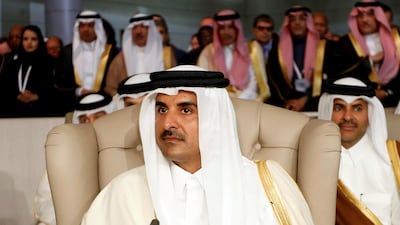A country smaller than Armenia in both land mass and population, Qatar commands a global presence disproportionate to its size. With plans to host the World Cup in summer 2022, Qatar remains at the forefront of the world's attention. While this spotlight has occasionally shed light on abuses of workers' rights in the build-up to the World Cup, far too little attention has been heeded to perhaps Qatar's most looming concern – its role as a sponsor of terrorism.
To this day, Qatar remains one of Hamas’s largest funders and supporters. Qatar has pledged more than $1.1 billion to Hamas since 2012. However, Hamas is an extremist group with a malign influence on the Arab-Israeli conflict and an extremist agenda. Doha has also welcomed high-profile Hamas figures, inviting senior officials such as Khaled Meshaal, the former chief of Hamas’s political wing. Ever since, Meshaal has taken full advantage of his hosts, arranging a Hamas conference at Doha’s Four Seasons hotel and revealing the group’s new charter in the city’s Sheraton hotel. Ultimately, Qatar has encouraged the Iranian-backed group to operate with impunity.
In addition to harbouring Hamas, the Qatari government has sought to amplify the organisation's voice and mission, as well as that of other terrorist groups. Through its state-owned, state-funded news channel Al Jazeera, the Qatari government has shared streams of Hamas's conferences and speeches. Al Jazeera has also glorified other terrorist organisations, dedicating airtime, for example, to an interview with a member of the Palestinian militant group Islamic Jihad.
Qatar's support for terrorism is not exclusively expressed through its support for Hamas, a reality that becomes more self-evident when analysing Qatar's ties to the Muslim Brotherhood. Recognised as a terrorist group by, among others, the UAE, Bahrain, Egypt, Russia, Syria and Saudi Arabia, the Muslim Brotherhood is accredited as the source and inspiration for Hamas and, by some scholars, as the inspiration for Al Qaeda when accounting for Sayyid Qutb's impact on MB ideology. Qutb was a prominent MB leader who was convicted and hanged for plotting the assassination of former Egyptian president Gamal Abdel Nasser. An Islamist organisation intent on establishing an ever-expanding caliphate, the Muslim Brotherhood has received more than $1 billion from the Qatari government.
Other benefactors of Qatari funding include Ahrar Al Sham, a Syrian militant group intent on establishing an Islamist state in the country, and Kataib Hezbollah, an Iranian-sponsored Shia militia bent on advancing the objectives of the Islamic Revolutionary Guard Corps. In 2017, Qatar paid hundreds of millions of dollars, including $25 million to Kataib Hezbollah and a suspected $50m to the leader of the IRGC, to release 25 Qataris taken hostage during a hunting trip in southern Iraq.
While Qatar currently harbours 20 high-ranking members of the Taliban, it also hosts some of Al Qaeda’s chief financiers, among them Khalifa Al Subaiy. A former employee of Qatar’s Central Bank, Al Subaiy financed Khalid Sheikh Mohammed, the mastermind behind the 9/11 attacks, according to US intelligence. In 2008, Al Subaiy was convicted in absentia by Bahrain’s High Criminal Court for financing and recruiting terrorists, a gesture that finally provoked Qatar to imprison him. Despite the banker being on the UN Security Council’s sanctions list, Qatari officials released him after a mere six months, allowing him to resume his funding of terrorism. Between 2011 and 2012, Al Subaiy sent hundreds of thousands of dollars to Al Qaeda leaders; in 2013 and 2014, he also began fundraising for the Taliban. Despite having every reason to suspect Al Subaiy’s conduct, the Qatari government turned a blind eye, allowing him to continue with impunity for years.
Qatar has also proactively shielded US-sanctioned financiers of Al Qaeda, granting them Qatari IDs and, thus, a safe haven. Cue Ashraf Muhammad Yusuf Uthman Abd Al Salam. A Jordanian, Abd Al Salam was sanctioned for dispatching hundreds of thousands of dollars to Al Qaeda’s branches in Iraq and Pakistan, and to the former Al Nusra Front, now Hayat Tahrir Al Sham, in Syria. Similarly, Jordanian Abd al Malik Muhammad Yusuf Uthman Abd Al Salam, also known as Umar Al Qatari, was arrested in Lebanon while bound for Qatar, with thousands of dollars intended for Al Qaeda in his possession. Al Qatari is also thought to have transferred tens of thousands of dollars to a leader of Al Qaeda’s branch in Syria, and to have fundraised and transferred tens of thousands of euros for senior Al Qaeda officials. By granting IDs to some of Al Qaeda’s core financiers, Qatar defends Al Qaeda’s infrastructure from its deepest roots, thereby emphasising its commitment to sponsoring terrorism.
Through its funding of terrorism and its harbouring of terrorists and their financial backers, Qatar has embraced its role as a sponsor of terrorism. While the impending World Cup is bound to impress spectators seeing Qatar for the first time, meaningful discussion regarding the nation’s role in sponsoring terrorism must be brought to the forefront. If football is a serious subject, the prospects of international security must be even more so.
Jordan Cope is a graduate in international relations

